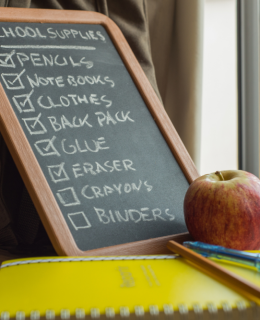
Homework can be divisive, confusing and frustrating. And that’s just for the kids! If it’s designed for your kids, it should be easy for you, right? You must have known this once before, so is your memory failing already? Is what they’re learning useless because you haven’t used this particular skill since you were their age?
Homework, despite all our grumbling gut instincts, is carefully designed to ensure that your child is mastering and practising important skills that may be valuable in and of themselves (like arithmetic) or as stepping stones to nailing a bigger, more complex skill (like grammar and spelling for writing fluently later). As adults, we’ve generally mastered the complete skill that may be being broken down for your child, so often their homework seems silly or strange or like a punishingly tricky way to solve a problem. If someone asked you to practice just changing lanes on the road for the sake of it, or to do experiments with your kitchen scales to make sure you could check the culinary arithmetic needed to bake a cake, you’d think it was a punishment, or you’d get bored, or you’d get frustrated that you couldn’t see the whole skill they were trying to teach you.
This is why, when it comes to helping with homework, adults need to swap their ‘I’ve got this’ hat for their ‘head cheerleader’ hat (or pom poms, as you see fit). Just as you wouldn’t do your child’s scales practice for them on their musical instrument, or do the exercises for their sport training instead of them, doing their homework for them is never going to be helpful. Equally, doing the emotional work of homework for children doesn’t help anyone – if you jump in to help and get more frustrated at the problem than they were because maths must have changed in the last 30 years, tomorrow’s homework will only be emotionally harder for everyone. But what can you actually do to help?
First rule of cheerleading? Bring the enthusiasm for the whole team to succeed. Think about your language around homework and consider the difference between ‘you’ve got homework to do’ and ‘we’re going to knock our homework out of the park’. One makes it sound like a punishment while the other tells your child that you care about their success, you’re on their side and that there will be recognition on the other side of their school bag. Bringing a team mindset to homework in households with siblings can make a huge difference to the evening’s atmosphere as it eliminates competition between siblings and replaces it with a presumption of helping each other, and celebrating each others’ victories.
Now to the nitty gritty. You’re looking at a problem and it (possibly literally) just doesn’t add up. You’re a fully functioning adult with children in your care – how can this be so difficult? This is where you become the coach as well as the cheerleader. You may not remember the work of Archimedes or Pythagoras or Jane Austen or Shakespeare as well as you once did but you sure do know how to solve a problem. So, assuming your child has just had some instruction in the relevant area that very day (or at least week), you now have to get the answers out of them, not out of you. Some magic words include:
- how else can we look at this?
- did the teacher give us anything to help us out?
- have you seen this tricky word/symbol before, and where?
- how far can we get with the rest of the homework if we skip this problem and come back to it?
- can we reverse engineer this (if the answer is available)?
- how can we responsibly use the internet to help?
- do you think we might find something in your class notes?
But I have multiple children and a house to keep together and a job and dinner to assemble, how can I do this for each child, each evening and still keep them (and me) alive? That’s why they’re called ‘magic words’. Helping your children to think about their homework as a problem to be solved with tactics you’ve modelled (rather than as a cleverness competition) gives them the skills and confidence to start being their own coach and cheerleader and your homework involvement can become less and less active as the term goes on.
This effect can be magnified with multiple children who can serve as problem solving sounding boards for their siblings. One of the most useful aspects of approaching homework as a team is that sibling competition (which is always ridiculous because children, even those who share DNA, are humans with as many dimensions and complexities as any other set of people so they can’t be compared, and is especially ridiculous when there’s an age difference) is traded for having a team. In any team, you need people with different skills to achieve the goal. Often, older siblings will have more skills in the homework arena because they’ve done the same things and more recently than their parents. However, younger siblings have the freedom of fewer years of academic training so they see solutions to problems that older kids might not consider. Add to that mixture of mindsets the differences in natural abilities and interests and you’ve got a strong team ready to tackle that algebra homework, no matter whose backpack brought it home.
But isn’t that cheating? Working together to solve a problem is a long way from cheating. Given that the point of homework is to master new skills and to engage your child’s memory to lock in whatever was covered in class, a process of explaining the problem to a parent or siblings (or other carer, grandparent or friend you may have phoned for help) and then of working through that problem will be richly rewarding.
So what if we’ve worked together, done research, cheered each other through and still cannot fathom how the answer in the back of the book relates in any way to the question? Are we all out of our intellectual depth? Have we wasted our time? Not at all!
You’ve bonded as a family, you’ve created a safe space in which to be wrong but also to try your best, and you can honestly tell the teacher that you tried. Sometimes the most valuable homework sessions actually result in a list of questions for the teacher to help your child get further into the problem the next time. This teaches your child to take ownership of their own learning, to think ‘how can I do better?’ instead of ‘I must be stupid/behind everyone else/lazy’ and to ask for help in a constructive and proactive way. That’s a skill that any parent should be ready to cheer!





